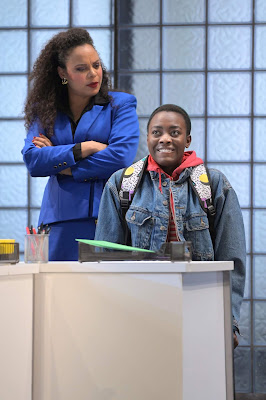 |
| Marlene (Michelle Beck, center) with her dinner guests, from left, Pope Joan (Rosie Hallett), Dull Gret (Summer Brown), Lady Nijo (Monica Lin) and Isabella Bird (Julia McNeal). |
It’s hard to ferret out details in American
Conservatory Theater’s season-opening production of Caryl Churchill’s “Top
Girls.”
The (mostly) English accents, rapid delivery and
overlapping conversations often muddied comprehension where I sat.
The overlapping conversations are dictated by the
playwright and are natural during a dinner party of six women. However, the
other two issues, accents and rapid speech, should have been more carefully
monitored by director Tamilla Woodard.
In Act 1, Marlene (Michelle Beck) is celebrating her
promotion at the Top Girls Employment Agency by throwing a dinner party. Her
guests, though, are women from throughout history who have overcome male
oppression.
They include Pope Joan (Rosie Hallett), a German who
reigned as Pope John VII from 855 to 857; Lady Nijo (Monica Lin), a 13th
century courtesan in the court of Japan who later spent 20 years wandering
through Japan as a Buddhist nun; and Isabella Bird (Julia McNeal), a Scottish
woman who traveled the world from age 40 until her death at age 70 in 1904.
Completing the guest list are Dull Gret (Summer
Brown), the subject of Bruegel’s 16th century painting, “Mad Meg,”
in which she leads a group of housewives in battle against devils in hell; and
Patient Griselda (Monique Hafen Adams), the obedient wife in “The Canterbury
Tales” and “Decameron.”
Unless one reads “Words on Plays,” sold for $5 in
the lobby, or had previously knowledge of the characters, the problems cited
above make their stories elusive.
The next scene starts with teenage Angie (Gabriella
Momah) and her friend Kit (Lily D. Harris) in the back yard of Angie’s home and
avoiding the calls of Angie’s mostly unseen mother, Joyce (Nafeesa Monroe).
 |
| Angie (Gabriella Momah) shows up at Marlene's office. |
Act 2, which is somewhat more successful, starts at
the employment agency where Marlene and her colleagues, Win (Hallett) and Nell
(Brown), separately interview hapless job seekers.
That’s when Angie shows up for a visit, much to
Marlene’s surprise.
 |
| Marlene, right, visits her sister, Joyce, Nafeesa Monroe. |
The final scene takes place a year earlier (again no
information in the program) when upwardly mobile Marlene and her sister, stuck-at-home
Joyce, whose husband has left, clash in Joyce’s cluttered home. Numerous family
issues are aired.
Despite the problems with Woodard’s direction, this
production features spot-on characterizations by everyone. Momah is especially effective
as the naïve, immature Angie.
Beck is razor sharp as Marlene, who has sometimes
ruthlessly overcome sexism and other obstacles in her professional and personal
life.
Costumes by Sarita Fellows are terrific, especially
for the banquet guests. The set by Nina Ball and lighting by Barbara Samuels
complement the production, but Jake Rodriguez’s sound design might contribute
to the problem of speech clarity.
Running about two and a half hours with one
intermission, “Top Girls” will continue through Oct. 13 at the Geary Theater,
415 Geary St., San Francisco.
Photos
by Kevin Berne







